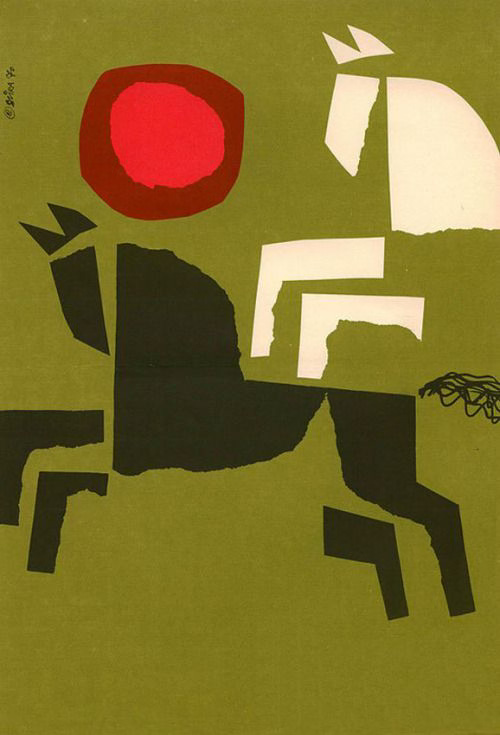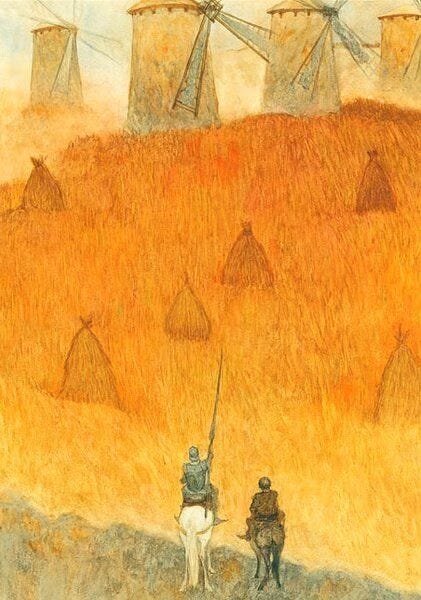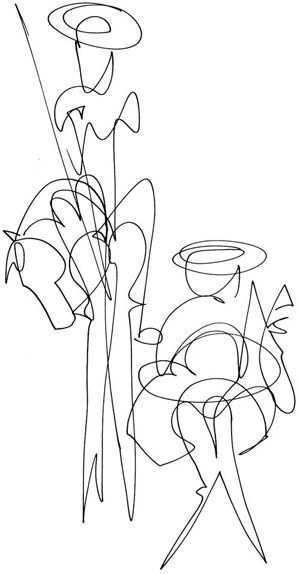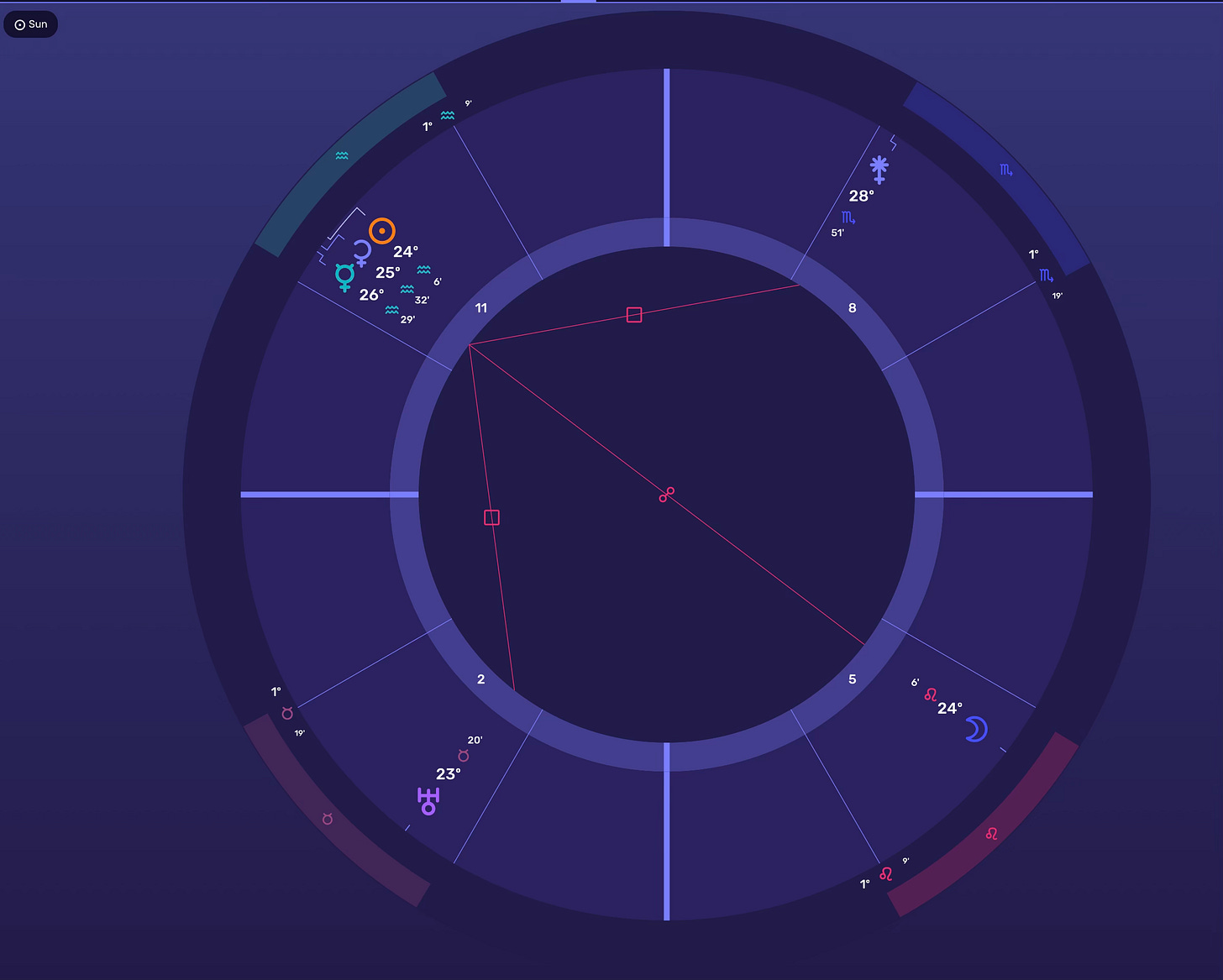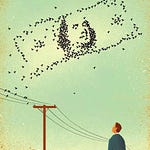"When life itself seems lunatic, who knows where madness lies? Perhaps to be too practical is madness. To surrender dreams—this may be madness. Too much sanity may be madness—and maddest of all: to see life as it is, and not as it should be."
—Miguel de Cervantes, Don Quixote de la Mancha
Few literary characters have captured the paradox of human existence as profoundly as Don Quixote. He is the madman, the dreamer, the fool—and yet, within his supposed insanity lies a radical truth: he refuses to see life as others do. While the world laughs at him, he remains committed to his vision, unshaken by rejection, ridicule, or disbelief.
Cervantes wrote Don Quixote de la Mancha in two volumes, the first published in 1605 and the second in 1615, during Spain’s Siglo de Oro (Golden Age), a period of immense artistic and literary achievement. Yet beneath the novel’s humor and irony, Cervantes was deeply engaged in a philosophical meditation on illusion and reality, individual will, and the ever-present conflict between personal conviction and societal expectations.
Italo Calvino1 saw Don Quixote as more than a dreamer—he saw him as a force that bends reality itself. Quixote’s world may be imaginary, but the sheer strength of his vision makes it almost real. Calvino called Don Quixote ‘polyphonic,’ a novel that does not just tell a story but questions the very nature of storytelling. Isn’t that exactly what happens when someone dares to live outside the prescribed narrative of society? Their reality becomes disruptive, forcing others to reckon with its existence.
At its core, Don Quixote is not just the story of a man who reads too many chivalric romances and decides to become a knight. It is the story of all individuals who dare to live according to their own truth, despite being called mad for doing so. Cervantes challenges the reader to ask: What is more foolish—to chase an impossible dream or to live a life dictated by the limitations imposed by others?
Spain at the time was an empire at its height but also one that was beginning to fracture. The rigid structures of feudalism, the deep influence of the Catholic Church, and the monarchy’s grip on power made it difficult for individuals to carve out their own destiny. Cervantes himself was no stranger to hardship—he had been a soldier, was captured and enslaved for five years in Algiers, and later struggled with financial difficulties and imprisonment. His personal experiences shaped his writing, infusing it with a deep awareness of human suffering and resilience.
Through Don Quixote, Cervantes presents a character who—despite his apparent foolishness—embodies the ultimate freedom: the courage to live by his own principles. He is rejected, attacked, and humiliated, yet he never abandons his quest. His very existence forces those around him to confront their own illusions and fears.
And isn’t that precisely what it means to stand for something in today’s world?
"Whenever humanity seems condemned to heaviness, I think I should fly like Perseus into a different space. I don't mean escaping into dreams or into the irrational. I mean that I have to change my approach, look at the world from a different perspective, with a different logic and with fresh methods of cognition and verification."
—Italo Calvino, Six Memos for the Next Millennium (Lightness)
The Role of Sancho Panza: The Anchor to Reality
If Don Quixote represents idealism, vision, and the unwavering pursuit of a dream, then Sancho Panza is the grounding force, the pragmatist, the everyman who walks beside the visionary yet never fully leaves behind the weight of reality. Sancho follows Don Quixote out of loyalty, curiosity, and the hope of material reward, but he never fully embraces the knight’s delusions—at least, not at first.
He is both a companion and a counterbalance, someone who doubts but does not abandon. At times, Sancho tries to reason with Don Quixote, pointing out the absurdity of his chivalric fantasies, yet as the novel progresses, something interesting happens—Sancho begins to believe. He starts to absorb the dream, to entertain the possibility that Don Quixote’s world of ideals might hold something real, something worth pursuing.
Sancho’s duality is the same one we see in society today. We live in a time when people are torn between pragmatic survival and the pull of something greater—an ideal, a higher vision. Some choose to walk the practical road, dismissing anything that disrupts the status quo. Others, like Don Quixote, insist on forging their own path, no matter the ridicule.
Sancho represents those who might not be willing to take the full leap into radical authenticity but who, nonetheless, find themselves drawn to those who do. They remain skeptical, yet they keep walking alongside the mad dreamers, the ones who refuse to conform.
There’s a moment in Don Quixote where Sancho, after years of journeying with his master, says:
"I am beginning to learn that the brave man carves out his own fortune."
Sancho, the ultimate realist, begins to understand that action—bold, unrelenting action—is what shapes destiny. He may never fully become Don Quixote, but he realizes that walking alongside him has given him a perspective beyond mere survival.
Full Moon in Leo: Tension Between Stability and Change
This Full Moon in Leo is deeply entangled in the ongoing evolutionary struggle between freedom and stability, personal validation and societal belonging, commitment and disruption. The astrology of this lunation presents a crucial moment of reckoning, where something has to give.
At the center, we have:
The Full Moon in Leo: A moment of emotional culmination, where we are asked to recognize where we shine, where we seek validation, and where we must embrace the fullness of our individuality.
The Sun Conjunct Ceres and Mercury in Aquarius opposing the Moon on Leo: This adds a layer of detachment and intellectual processing. Ceres in Aquarius suggests nurturing through freedom and nonconformity, while Mercury in Aquarius sharpens our ability to see the bigger picture. Together, this is about understanding how we care for ourselves and others without losing our independence.
Uranus in Taurus Squaring the Full Moon (First Quarter Square): Uranus, the great disruptor, is shaking the foundations of comfort, stability, and material security. This fixed sign tension between Leo and Taurus demands a shift—are we holding onto outdated structures that no longer serve us? Are we afraid to step fully into our freedom because it threatens our sense of stability? Uranus is the wild card, and this square reminds us that true liberation often comes through discomfort.
Juno in Scorpio (Last Quarter Square): Juno, representing commitment and contractual relationships, is in deep, transformative Scorpio, making a last-quarter square to the Leo Sun. This is a test of commitment—not just to others, but to ourselves. Are we truly loyal to our deepest values, or are we compromising in ways that keep us trapped?
What This Full Moon Asks of Us
What is more important—our need for personal validation or our place in the world?
The Leo Moon wants to be seen, acknowledged, and celebrated for its uniqueness. But with Mercury and Ceres in Aquarius, we are also being asked to detach from our perspective and view ourselves from a more objective one. Are we seeking validation in ways that keep us from stepping into our true individuality?
Are we committed enough to our own values?
Juno in Scorpio is a serious energy—it wants depth, truth, and unwavering commitment. But to what? Are we still clinging to external commitments that no longer align with our core principles? Or have we made a promise to ourselves to honor what we truly believe in? This Full Moon exposes any misalignments between our stated values and our lived reality.
What resources are we grounding now to ensure expansion later?
Uranus has been in Taurus for seven years, shaking up everything we thought was stable—our financial systems, our definitions of value, our relationship to personal security. Soon, Uranus will take a brief step into Gemini before returning to Taurus for one last round. This is the moment to ask: What have I built in the last seven years that truly supports my freedom? Almost a year ago, Uranus and Jupiter met in Taurus, expanding a new path forward. The effects of that conjunction should now be visible. Are you seeing that expansion in your life? If not, what is still blocking you?
Something Has to Give
Fixed signs (Leo, Taurus, Scorpio, and Aquarius) resist change more than any other. They hold the structures of life in place, maintaining continuity, but they can also become stuck, unwilling to adapt even when adaptation is necessary.
This Full Moon is creating a T-square in fixed signs, meaning the pressure is reaching a breaking point. The energy is not necessarily about letting go, but about reconfiguring what isn’t working.
If your sense of validation is coming from outdated sources, it's time to realign.
If your commitment is built on shaky foundations, it’s time to reinforce or release it.
If your resources (financial, energetic, or emotional) are still tied to structures that don’t support your future, it’s time to make a move.
Back to the Bigger Picture
This Full Moon, much like Don Quixote’s journey, challenges us to distinguish between illusion and truth—between the fleeting need for external recognition and the enduring power of inner conviction. Uranus reminds us that freedom isn’t given; it’s claimed. Juno asks us: Are you ready to commit to your highest values?
And most importantly, this lunation is a checkpoint: What have you done in the last six months to embody the expansion that Jupiter and Uranus initiated almost a year ago? The universe is watching, and so is your future self.
Resonances across time
Something I love is finding resonances across time—moments where the past speaks to the present, where patterns emerge, confirming a deeper, unseen connection. Looking at Miguel de Cervantes' chart, I see those echoes, those threads that weave his journey into mine.
His Pluto in Aquarius square the nodes (skipped steps) tells the story of an individual pushing against the weight of history, forcing evolution by challenging the structures that seek to contain thought and expression. His South Node in Taurus, North Node in Scorpio—the eternal pull between survival and comfort (Taurus) and confrontation and transformation (Scorpio), between preserving the known and stepping into the unknown. That same tension lives in the world today, and it pulses in my own work—the necessity to disrupt the status quo to honor something deeper, more real.
When the second edition of Don Quixote was published, Chiron was at 6° Aquarius—a wound in the collective mind, a break in perception, a moment where the vision of one could no longer be dismissed. This Chiron point meets my Ascendant, and I feel that imprint—the push to bring forth ideas that might wound before they heal, that might unsettle before they liberate. There’s something profoundly fated about the way expression shapes identity—how being seen and heard can become both the wound and the medicine.
His Chiron and Ceres trine Pluto and form an inconjunct to the North Node at 21° Gemini—aligning with my Venus, reinforcing this idea of nourishing thought, cultivating language as a means of both survival and expansion. Words are more than tools; they are acts of rebellion, acts of devotion, acts of creation. His work—his defiance of literary and societal expectations—wasn't just about telling a story. It was about bending reality itself, proving that a vision, even if ridiculed, has the power to shape the world.
The drive to move forward, to challenge, to push through. The instinct to fight for what matters, to refuse to yield to the expectations of others. His Moon in Aries aligns with my natal Mars at the same degree—his emotional core was restless, urgent, independent. He did not wait for approval. Neither do I.
And then there’s his Jupiter at 3° Pisces, sitting on my Saturn. His expansive, imaginative philosophy meets my structure, discipline, and the lessons I am meant to embody. What he initiated, I am grounding. His Uranus in Virgo, like mine, speaks to breaking systems from within, disrupting through precision, creating clarity where others see only disorder—while remaining a vessel of service through authentic behavior.
I don’t just admire Cervantes—I recognize him. The way he challenged narratives, the way he held onto his vision despite the world rejecting it, the way he used words as weapons and tools of liberation. His life, his struggles, his insistence on carving his own path—it all speaks to something I have always known.
The resonance is undeniable. Across time, across space, across the shifting tides of history, the same fire burns.
The Court of Authenticity
Last weeks, I wrote a lot about meaning and changing perspectives. On a personal note, I've been confronted with something that started emerging and becoming very clear. It was the rejection I was causing in a lot of people because of where I stand today and how people see my views as a threatening force, preventing them from allowing me into their lives.
At first, I didn’t fully understand what exactly they were rejecting. I could have an image of it, but then I just let it be. I don't like to judge judgments. Let’s put it this way: you judge me, and then I’m going to judge you for judging me. That’s wasted energy. But I am very attentive to understanding how I am perceived and also how people react towards me.
I have also found incredible value in how people respond to me even though we don't agree. I have the case of two different people that I've known for a while. I could add a lot to the first group—those who basically closed their lives to me with no notice just because I had certain standings. When I go back and confront them, simply asking—I have no idea what happened. I can imagine, but I'm not going to judge you. I just noticed that—they respond with something like, Well, your views. I became repulsed by them. I felt a very hard rejection. And I had to sit with that, read it, and see how my body responded to it.
So I’m in that process right now—response. I am aware of where I’m standing, and I am aware right now of how this made people react to me instead of responding. That awareness is so important because it gives me the support I need to keep on going and trusting my authentic values. Of course, I knew it had to do with those views—very radical views, according to people. But what interests me is that I have also had conversations with others who say, Even though we don’t agree on almost anything, we respect each other. And I find that incredibly enriching and wise, to say the least.
Don Quixote was ridiculed for seeing the world differently. He was mocked for believing in something greater than the accepted reality of his time. And yet, who among us has not been labeled foolish for refusing to conform?
So where do I stand with that? Do I go to my heart and say, Oh boo boo boo boo, it hurts that I'm not accepted and rejected and pushed away, closed and, I don’t know, discarded? Because that’s the word. Or do I stand firm in my views and ask myself, Do I have to change them to be accepted?
“The truth may be stretched thin, but it never breaks, and it always surfaces above lies, as oil floats on water.”
This is really the court of authenticity. You either keep standing for who you are, or you bend yourself into something more palatable for others. If people projected ideas of who I was, or who I am, or if I stood in different places before and then realized I wanted to change my mind, my perspective—and now, because of that, people stop having relationships with me—what is more important?
For me, the answer has always been clear: staying close to what I believe or at least what I stand for.
“He who loses wealth loses much; he who loses a friend loses more; but he that loses his courage loses all.”
Food for Thought: Meaning & Evolution
This Full Moon in Leo on Feb 12, forms a T-square with Uranus, just like six months ago, but in reverse. The Full Moon in Aquarius then2, now this one in Leo. What have you done in the last six months that has given you the freedom to be yourself? Where are you shining your light? What steps are you taking toward your own individuation?
This is the journey of Don Quixote—choosing a path that may seem foolish to others but staying committed to his vision. Cervantes gave us a character who, despite ridicule and rejection, saw a world not for what it was but for what it could be.The question is: are you willing to be bold enough to hold your vision? To walk your own path?
I don’t want to be antagonistic with my belief systems. I want to embrace other people’s views without compromising my own values. But I will not stand for people coming at me with attacks or judgment. If someone doesn’t want me in their life, that’s their choice. But I no longer meet rejection with rejection. I used to be more radical about that—I used to be more dismissive—but I have come to understand that boundaries are different from exclusion. I only reject people who violate my personal boundaries. Those are the ones I draw a firm line with, and in that, my boundaries become meaningful.
Cervantes was writing during a time when the Spanish empire was at its height but also at a turning point, a moment of dissolution and rebirth. And isn’t that what we are living through now? Old paradigms are collapsing. New ones are struggling to emerge. Standing for something is seen as radical, even dangerous. But what greater purpose is there than to live in alignment with what you know to be true?
Everything is connected, isn’t it? The breaking, the rebuilding, the courage, the values—it’s all part of the cycle.
Bitcoin and Don Quixote: The Visionaries and the Pragmatists
If Don Quixote represents the bold, relentless vision of a world that does not yet exist, then Bitcoiners are the Quixotes of our time. They move ahead of society, seeing a paradigm shift long before others can grasp it. They are dismissed as lunatics, as hopeless idealists fighting windmills, but what they are actually doing is carving out a path that will one day be recognized as inevitable.
Sancho Panza, on the other hand, represents the pragmatists—the majority of society that hesitates before taking the leap. They are not necessarily against the vision; they simply require more proof, more stability before committing. Sancho follows Don Quixote not because he fully understands his master's madness but because, deep down, he senses that there is something real in what Don Quixote sees. Likewise, many people today hesitate to adopt Bitcoin, waiting for signs that the ground is steady before taking a step forward.
This is how history always unfolds. First, there are the trailblazers—those who walk ahead without guarantees, guided only by conviction and a sense of destiny. Then, there are the others—those who eventually follow, not out of opposition, but because they needed time. Neither path is better than the other; they are simply different roles in the process of evolution.
The world needs both—the Quixotes who charge ahead, unafraid of ridicule, and the Sanchos who keep them grounded, question them, and ultimately, once convinced, help bring their vision to the rest of society. This is how change happens.
As Cervantes reminds us:
“Too much sanity may be madness—and maddest of all: to see life as it is, and not as it should be.”
Bitcoiners, like Don Quixote, see life as it should be. And history tells us that what is seen as madness today is often recognized as genius tomorrow.
And I trust this cycle completely.
This February, all articles are free! Consider subscribing, supporting my book, booking a session, or learning about Bitcoin. Plus, you'll receive a complimentary 6-month subscription!
🎙️Efrat & Monika Going Live!
From my dear friend, Efrat Fenigson podcaster [YOU’RE THE VOICE] & Bitcoiner extraordinaire: Join us tomorrow and once a month!
Italo Calvino's lecture Lightness, the first of five essays in Six Memos for the Next Millennium, explores lightness as an essential literary and philosophical quality. Originally prepared for the 1985-86 Charles Eliot Norton Lectures at Harvard, the series remained unfinished due to Calvino’s death. In Lightness, he emphasizes removing "weight" from narratives, language, and perception, using the myth of Perseus and Medusa as a metaphor for a strategic, agile approach to reality. He extends this concept to modern science, contrasting the heaviness of hardware with the commanding role of "weightless" software. Calvino sees lightness as a counterbalance to existence’s burdens, offering a way to transcend limitations and embrace new perspectives.




